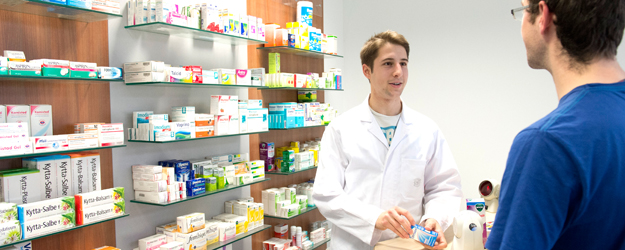20 February 2014
The training pharmacy at the Institute of Pharmacy and Biochemistry at Mainz University gives students the opportunity to practice dealing with customers. It’s all about practical application. The aspiring pharmacists learn what it will be like later in their professional lives.
Everything looks exceptionally real – the counter with the cash register computer, shelves full of medicine boxes, the nice smiling man in the white coat. "When we built this here, we actually had colleagues come in who wanted to buy something from us," says Dr. Bettina Zeiter, smiling. "They thought we had opened a real pharmacy."
But this is just as it should be in the training pharmacy set up by the Department of Clinical Pharmacy of Johannes Gutenberg University Mainz (JGU). The idea is to give students a feel for their later professional roles. Here, Zeiter and her doctoral students stage consulting and sales pitches like those that take place every day in a real pharmacy.
Dealing with customers role play
A young man comes in and says he has a nail fungal infection. What should he do? Go for an ointment, or is the nail already too far eaten away? An elderly lady has her blood pressure measured; her blood glucose level is to be checked at the same time. A pregnant woman is coughing her lungs out. She simply cannot get rid of this cold. But is it really just a cold? Can the pharmacist recommend something suitable? What is to be considered in the case of a pregnant woman? Maybe she would be better off seeing a doctor?
"Of course our students have inhibitions about role playing at first," explains Zeiter. The pharmacy specialist for Clinical Pharmacy is responsible for the training course in the training pharmacy at Mainz University. "But their reservations are quickly pushed aside." And the concept has proved to be effective. "This is practical learning. Before we had this pharmacy, we only had theoretical lectures in our discipline."
Innovative teaching project
Clinical Pharmacy is a fairly new discipline. It became an examination subject for those studying Pharmaceutical Sciences only in 2000. It has a clear practical orientation. Center stage are customer contact and the science of medication. Thus it is standing to reason that the institution opened a training pharmacy of this kind.
"Yet very few German universities have one," says Zeiter. In 2010, Irene Krämer, Professor of Clinical Pharmacy at the JGU Institute of Pharmaceutical Sciences and Director of the pharmacy of the Mainz University Medical Center, and her research associate Marion Eberlin came up with the idea of establishing a training pharmacy.
The Gutenberg Teaching Council (GTC) at Johannes Gutenberg University Mainz then gave its support to this innovative teaching project. Various sponsors furnished the facility. It looks just like a real pharmacy – only the medication boxes are a bit too light because they are empty.
Crib sheet on the screen
Zeiter stands behind the cash register computer. It is the technical heart of the pharmacy. A small gray card is glued inconspicuously next to the screen. "You will actually find this in any pharmacy," she explains. The card lists the main questions to be asked during a consultation. It starts with: "Who is affected? What are the symptoms? How often do the symptoms occur?"
"In the beginning, the students are overwhelmed. There are so many medications from which to choose and the customers want to be helped quickly." Sometimes there are complicated cases, sometimes the clients themselves are difficult; this is something that Zeiter feels is essential for the purposes of role playing. "In such cases, the crib sheet can be a real help."
A special computer program offers additional help for pharmacies. Zeiter scans a bottle of aspirin. The screen immediately displays the types of disorders for which aspirin is recommended and other medications with which it could interact. "When something is displayed in red that means it is an absolute contraindication." Anyone who takes a blood-thinning agent, for example, must never take aspirin. "We must make sure customers are aware of this." The program runs through a checklist. It looks at allergies, use during pregnancy, and much more.
Extra communication training
But that is only the one side. "It is very important to communicate with the customers. We offer specialized training for this. In general, the trend is for pharmacists to increasingly provide advice." Zeiter knows what she is talking about. She herself not only works at the Pharmaceutical Institute of Mainz University, but also in a real pharmacy. "If that were not the case, I would quickly lose contact with the practical side of things."
Students attend the seminar in the training pharmacy during the sixth semester of their course. They play through dealing with customers in small groups. In addition, they complete a 'virtual internship': They select a pharmacy-related topic, work on it, and upload the results to the website of the Department of Clinical Pharmacy, creating info sheet-like documents. "In the seminar, we will then discuss whether everything is sufficiently clear and well laid out."
Time-consuming project
Zeiter has headed up the training pharmacy for two years now. "It involves a lot of effort," she says. "During the semester, I hardly have time for anything else. The role playing scenarios need to be designed, seminars prepared and followed up - and then there are so many other little things such as to make certain that the medicine packages are up to date."
Despite the effort, the project is worthwhile. The student feedback has been very positive. Unfortunately, training pharmacies are still rare. "In Frankfurt, they are currently considering to establish one," says Zeiter. "They have been here to take a look at our project."
So it would seem the concept of the training pharmacy of the Institute for Pharmaceutical Sciences at Mainz University is gradually catching on. Because even if there is nothing to buy, students can learn a lot here for their future careers.



